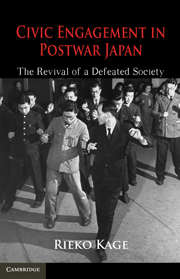Book contents
- Frontmatter
- Contents
- List of Tables
- List of Figures
- Preface
- Acknowledgments
- Civic Engagement in Postwar Japan
- 1 Introduction
- 2 Civic Engagement: The Dependent Variable
- 3 War and Civic Engagement: A Theoretical Framework
- 4 Quantitative Analysis: The Rise of Civic Engagement across Forty-Six Japanese Prefectures
- 5 The Long-Term Effects of Wartime Mobilization: Cross-National Analysis
- 6 Repression and Revival of the YMCA Japan
- 7 Wartime Endorsement and Postwar Repression of a Traditional Art
- 8 Civil Society and Reconstruction in Postwar Japan
- 9 Conclusions
- References
- Index
3 - War and Civic Engagement: A Theoretical Framework
Published online by Cambridge University Press: 06 December 2010
- Frontmatter
- Contents
- List of Tables
- List of Figures
- Preface
- Acknowledgments
- Civic Engagement in Postwar Japan
- 1 Introduction
- 2 Civic Engagement: The Dependent Variable
- 3 War and Civic Engagement: A Theoretical Framework
- 4 Quantitative Analysis: The Rise of Civic Engagement across Forty-Six Japanese Prefectures
- 5 The Long-Term Effects of Wartime Mobilization: Cross-National Analysis
- 6 Repression and Revival of the YMCA Japan
- 7 Wartime Endorsement and Postwar Repression of a Traditional Art
- 8 Civil Society and Reconstruction in Postwar Japan
- 9 Conclusions
- References
- Index
Summary
INTRODUCTION
Chapter 1 pointed out that most of the existing theories of participation would expect a country's victory or defeat to crucially determine its trajectory of civic engagement in the wake of wars. Chapter 2 presented new data to show that, contrary to these expectations, civic engagement rose at an impressive rate in defeated Japan in the wake of World War II. It also demonstrated the substantial variation in the extent to which civic engagement grew in the wake of war across different Japanese prefectures.
Given the confluence of stagnant economic growth, loss of educational opportunities, and psychological devastation that Japanese citizens faced in the immediate postwar period, conditions in Japan should have been particularly adverse to any rise in civic engagement. If the victory/defeat hypothesis cannot explain a case of defeat as complete as Japan's, this leads us to question the applicability of the hypothesis in any case.
Why might levels of civic engagement rise in the wake of war, even in the face of devastating defeat? And what accounts for the variations in the extent to which voluntary participation rises in the wake of war? The present chapter takes a step back from the Japanese case and develops a new theoretical framework to explain the more general relationship between war, on the one hand, and the postwar trajectory of civic engagement, on the other.
- Type
- Chapter
- Information
- Civic Engagement in Postwar JapanThe Revival of a Defeated Society, pp. 44 - 63Publisher: Cambridge University PressPrint publication year: 2010

